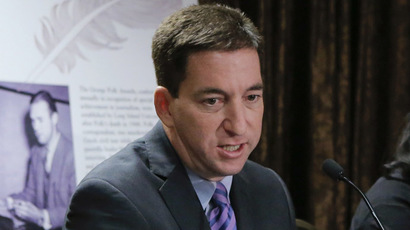Anonymous hacktivists plan massive attack on Brazilian World Cup sponsors – report

Amid mass demos and violence over extravagant World Cup spending showing little promise of return for an impoverished Brazil, Anonymous hackers plan a mass hack attack on the Cup’s sponsors, a source told Reuters.
High inflation and low business investment have hampered the government’s recent attempts to boost the economy ahead of the tournament. All this is happening as some of the country’s most pressing social and other problems have been neglected, with rampant poverty and destitution rife in large parts of the capital.
People are up in arms, staging protest events for a number of reasons, the latest of which are centered on skepticism that the lavish spending on the World Cup will benefit them in any substantial way. This Friday, several simultaneous events blocked Rio de Janeiro’s main roads, paralyzing traffic.
Anonymous hacktivists are allegedly taking matters into their own hands, threatening some of the major sponsors of the World Cup. On Friday, Reuters spoke to a member who allegedly has intimate knowledge of the plan, after an attack took place earlier this week that targeted the Brazil foreign ministry’s networks and led to the leak dozens of confidential emails. Already heralded as the biggest cyber-security breach since the NSA accessed President Dilma Roussef’s personal communications, the last attack caused the leak of 333 documents, according to Che Commodore, the hacker who spoke to Reuters.
In the last attack, hacker AnonManifest used phishing tactics to hack into the Foreign Ministry's databases and access emails, Che Commodore explained.
And “until yesterday, the hacker still had access to the system,” he added, showing just how powerless the government can be in the face of such computer wizardry and a disgruntled population. Later, the government attempted to downplay the damage done.

Che Commodore gave comprehensive information about the upcoming attack as well, although the agency had no means of confirming his identity or connection with the infamous hacker group.
“We have a plan of attack,” Che told the agency. “We have already conducted late-night tests to see which of the sites are more vulnerable… This time we are targeting the sponsors of the World Cup,” he said, speaking by Skype from an undisclosed location in Brazil.
All the world’s main commercial players in their respective industries are involved in the 2014 World Cup, and most have made the hit list, according to the computer wizard; Coca Cola, Budweiser, the Emirates airline and Adidas are among them.
The proposed method of attack is reportedly going to be a run-of-the-mill DDoS, which aims to create thousands of simultaneous access requests to a selected site in order to overload and crash it.
The World Cup is already plagued by a host of problems, from poverty to the embarrassing security situation, through to police violence in their attempts to ‘clean up’ the capital’s ‘favelas’ (slums). Infrastructure delays have also recently had organizers wondering whether holding the event in Brazil was a good idea at all. Poverty is one thing, but some stadiums stood unfinished dangerously close to the start date of June 12.
FIFA secretary general Jerome Valcke expressed concern on Thursday over the state of three of the twelve massive stadiums that have been built or refurbished for the event, capping off a two-week trip by warning organizers in Natal, Porto Alegre, and Sao Paulo - which will host the first match in two weeks - that it is now a “race against the clock.”
Any further embarrassment could be a major dent, as this week’s attack had Brazilian diplomats left without email for several days. On Friday, one of them told Reuters he still couldn’t access his email.














